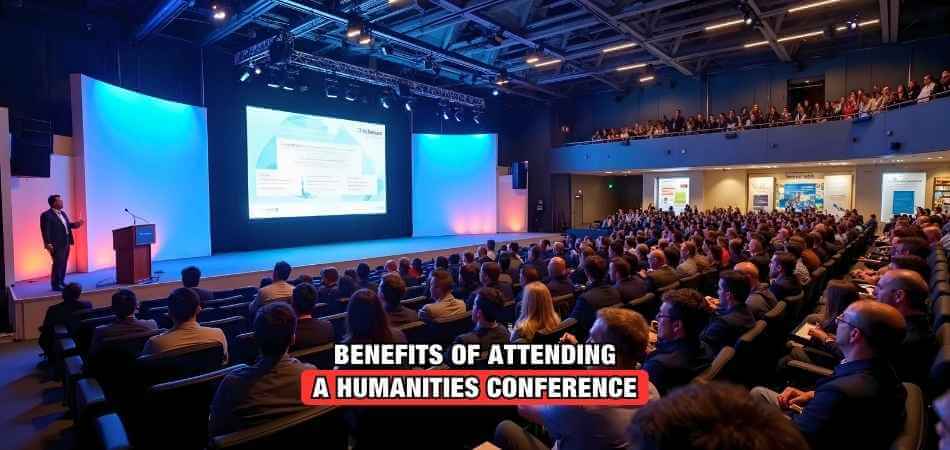Currently, humanities conferences are vibrant spaces where ideas flourish and knowledge is shared. They attract scholars, thinkers, and enthusiasts from diverse fields to explore human culture, history, and thought. Now, you might wonder about the benefits of attending a humanities conference.
Participating in such events opens doors to networking with experts, accessing the latest research, enhancing communication skills, and gaining career insights. You’ll gain knowledge from diverse perspectives, recharge your motivation, and even discover collaboration opportunities that could shape your academic or professional development.
Curious to learn more? This article dives deep into the key aspects of attending a humanities conference, offering all the essential details to make the most of this enriching experience. Read on to find some valuable insights.
Historical Overview of Humanities Conferences
Humanities conferences have long been platforms for intellectual exchange and collaboration, tracing their origins back to the Enlightenment era. These early events often featured philosophers and scholars presenting ideas that influenced modern thought. Over time, the scope of these conferences broadened, encompassing diverse disciplines such as history, literature, and philosophy, promoting interdisciplinary dialogue.
In the 20th century, technological advancements and globalization expanded the reach of humanities conferences, enabling participants from across the globe to share insights. Prestigious gatherings in Europe and Asia set the stage for new academic trends, while regional events supported localized scholarly networks. As these events grew in prominence, they became essential for presenting innovative research and nurturing academic careers.
Today, humanities conferences are held worldwide, including in countries like Canada, the United States, and the UK. These events attract scholars seeking diverse perspectives and international exposure. Many choose to attend international humanities conferences in Canada, known for their robust academic frameworks and multicultural ethos. Such events provide a valuable platform for connecting with global peers and exploring innovative ideas in the humanities.
Benefits of Attending a Humanities Conference
At a humanities conference, one can gain knowledge and inspiration as well as chances for both professional and academic development. These events encourage collaboration and provide insights that improve vital thinking. Below, explore the key benefits of joining such engaging and intellectual gatherings.

Networking with Experts
Meeting experienced professionals and influential thinkers at a conference opens doors to opportunities you might not find elsewhere. Conversations with such individuals provide valuable guidance, help you gain insights into your field, and broaden your knowledge base. These connections often lead to collaborative projects, recommendations, or even mentorship opportunities that last beyond the event.
Access to the Latest Ideas
Conference presentations showcase the latest research, theories, and innovations that shape the field of humanities. By attending sessions, you gain exposure to novel ideas and perspectives, sparking creativity and deepening your knowledge. These latest discussions can inspire new approaches to your work and enhance your critical thinking.
Enhancing Your Research Skills
Participating in workshops and interactive sessions sharpens your research and analytical abilities, equipping you with new methods and tools. Discussions around methodologies and case studies enable you to think strategically and adapt innovative techniques to your projects. This experience helps build confidence and enriches your scholarly expertise.
Strengthening Communication Skills
Engaging in discussions, asking questions, and articulating your ideas at conferences improves your ability to communicate effectively. Practicing these skills in a professional environment enhances your confidence and equips you for future public speaking or networking situations. Clear communication is essential for academic and professional success.
Gaining Career Insights
Conferences often include sessions on career development and navigating professional challenges within the humanities field. Insights from seasoned professionals guide attendees on how to pursue rewarding careers, develop unique skill sets, and stay updated on industry trends. Such knowledge is vital for making informed career decisions and staying competitive.
Immersing in Diverse Perspectives
Interacting with attendees from diverse backgrounds introduces you to varied viewpoints, cultural insights, and academic approaches. These interactions enable a richer knowledge of global issues and enhance your ability to collaborate effectively with others. Such experiences are invaluable for developing empathy and broadening your intellectual scope.
Recharging Motivation and Focus
Immersing yourself in an inspiring environment full of passionate individuals rekindles your enthusiasm for your work. The energy and ideas shared during sessions help you maintain your academic and professional focus. Conferences remind you why you chose the humanities field, helping you reconnect with your purpose and goals.
Presenting Your Research
Sharing your work with an audience at a conference enhances visibility and gives you valuable feedback from peers. When you submit a proposal to present at a humanities conference, you gain opportunities to refine your ideas, build confidence, and receive constructive critiques that inspire new research directions and improve future work.
Building Long-Term Collaborations
Collaboration opportunities often emerge from casual conversations, panel discussions, or shared interests discovered at conferences. These connections evolve into productive partnerships that yield joint research, publications, or creative projects. Collaborative efforts lead to enriching experiences and shared accomplishments that benefit all participants.
Humanities conferences are memorable spaces where knowledge grows, perspectives expand, and skills improve. Engaging with others and gaining insights through these events enrich your journey in meaningful ways. Investing time in attending ensures long-lasting personal and professional benefits that influence your path.
Humanities Conferences: How Do I Attend?
It is a great chance to learn more and connect with experts by going to a humanities conference. Whether you’re a student or a seasoned academic, these events provide a space for learning and collaboration. You can participate in discussions, gain fresh insights, and connect with like-minded individuals. Here’s how you can attend one:
Step 1. Research Upcoming Conferences
Explore reliable sources like academic journals, university websites, and professional networks to discover upcoming events. Study the conference themes, keynote speakers, and agenda to ensure they align with your interests. Make a list of dates and deadlines, including submission opportunities, if you plan to present. Proper planning ensures you select conferences that match your goals effectively.
Step 2. Register Early
Complete your registration promptly to secure your spot and benefit from any early-bird discounts. Check for available packages that might include access to workshops or networking events. Early registration helps you avoid missing out on limited opportunities. Carefully review your details, ensuring everything is accurate, including your name and affiliations for the conference materials.
Step 3. Prepare Your Materials
Gather all necessary materials, like research abstracts, presentation slides, and note-taking tools. If you are presenting, rehearse thoroughly to deliver confidently and stay within the time limits. Print your business cards or create a digital version to share during networking opportunities. Being prepared ensures you’re ready to participate fully and leave a good impression.
Step 4. Attend Key Sessions
Identify sessions or panels that closely match your research interests or areas you want to explore. Arrive a few minutes early to get a good seat and settle in. Engage actively by listening, taking notes, and asking thoughtful questions during discussions. Making the most of selected sessions deepens your learning and enriches your experience.
Step 5. Network and Engage
Take advantage of coffee breaks and networking events to introduce yourself and discuss common interests with others. Share your research ideas or seek advice from experienced professionals. Collect contact information, such as email addresses or LinkedIn profiles, to stay in touch. Building meaningful connections during the event can lead to collaborations and future opportunities.
Humanities conferences are wonderful platforms for expanding your knowledge and forming valuable connections. Approach the event with enthusiasm and a readiness to engage fully. Keep the connections alive post-conference to make the most of your participation. Every interaction can become a stepping stone for your academic and professional journey.
Key Factors to Consider Before Attending a Humanities Conference
A humanities conference is a fantastic way to learn more, connect with professionals, and discover fresh viewpoints. To make the most of your experience, you should consider key aspects before committing to any event. Here are some considerations:
Location and Accessibility
Think about how accessible the conference venue is and its overall location. Check if the city offers convenient transportation, safe surroundings, and cultural activities. For example, cities hosting major conferences often provide additional attractions that enhance your visit, making it a more rewarding experience.
Budget Planning
Analyze your expenses, including travel, lodging, and meals, alongside the registration fee. Suppose you’re planning to attend a Canadian event. Knowing the cost to attend a humanities conference in Canada will help you organize your budget. Financial preparation ensures you can focus on the experience without concerns.
Session Relevance
Look into the schedule and session details to ensure the topics align with your goals. Seek sessions that explore your areas of interest or challenge your perspectives. An agenda rich with variety enhances the value of attending and contributes significantly to your professional growth.
Networking Opportunities
Research the conference’s structure for networking chances, such as social gatherings, panel discussions, and informal meetups. These interactions are crucial for building connections and learning from others. Networking moments often result in lasting collaborations or insightful guidance for your academic or career development.
Quality of Participants
Review the list of speakers and attendees to gauge the quality of the event. Renowned speakers or a diverse participant base can make the event more impactful. Exposure to different viewpoints ensures you return with valuable insights and experiences that broaden your knowledge.
Carefully considering these factors ensures that your decision to attend a humanities conference brings the best results. Planning well guarantees you gain knowledge, build connections, and make the most of this enriching academic opportunity.
Tips to Get the Most Out of a Humanities Conference
Participating in a humanities conference can be a rewarding experience. It offers a chance to expand your knowledge and connect with others in your field. To make the most of it, consider these useful tips:
- Plan Ahead: Take the time to review the conference agenda and identify the sessions that interest you most. This allows you to maximize your time and ensures you don’t miss key discussions or activities.
- Engage with Speakers: Don’t just attend lectures, actively engage with speakers during Q&A sessions or informal chats. Asking insightful questions can lead to valuable interactions and provide you with deeper insights into the topics.
- Network Actively: Look for opportunities to connect with other attendees outside of formal sessions. Whether during breaks or social events, networking is crucial for sharing ideas and forming long-term professional relationships.
- Take Notes: Write down key ideas, quotes, or references you encounter throughout the conference. These notes will help you remember important details and serve as a useful reference for later discussions or research.
- Participate in Discussions: Join in discussions during panels or workshops. Being an active participant shows your engagement and can help you build credibility within the academic community. It also enhances your learning experience.
- Prepare to Share Your Ideas: Be ready to share your work or thoughts during networking events or informal settings. Presenting your ideas confidently can help you gain feedback and make connections with like-minded individuals.
- Explore the Venue: Take the time to explore the conference venue and surrounding areas. This helps you to unwind and enjoy the atmosphere, which can enhance your overall experience and networking opportunities.
- Follow Up: After the conference, follow up with the people you connected with. A simple email or LinkedIn message can help you maintain those new relationships and keep the conversation going.
A well-prepared and engaged approach to attending a humanities conference will significantly improve your experience. These tips can help you maximize your time, build connections, and gain insights that benefit your academic and professional growth.
FAQs About Benefits of Attending a Humanities Conference
Taking part in a humanities conference can be an enriching experience, but you may have a few questions before diving in. Below, we’ve compiled answers to some frequently asked questions to help you understand how these events can truly benefit your academic and professional growth.
What Can I Learn from Attending a Humanities Conference?
You can become familiar with the most recent findings, theories, and viewpoints in your field by going to a humanities conference. You learn about emerging trends, gain insights from expert speakers, and see how various scholars approach topics. This experience provides an invaluable learning opportunity that goes beyond books and lectures.
How Do Humanities Conferences Encourage Creative Thinking?
By introducing participants to a range of perspectives and advancing research, humanities conferences encourage creative thinking. Listening to different presentations and engaging in interactive sessions sparks fresh ideas. The environment encourages an open exchange of knowledge, inspiring you to think outside the box and apply unique approaches to your work.
How Do Conferences Help Expand My Academic Circle?
There are many chances to meet people who share your interests at humanities conferences. Attendees can network during breaks, panel discussions, and social events, leading to potential collaborations. Engaging with scholars from different regions helps broaden your academic circle, often resulting in long-term, mutually beneficial professional relationships.
Are Humanities Conferences Suitable for Students?
Yes, humanities conferences are suitable for students who want to deepen their knowledge and gain exposure to academic discussions. These events provide students with valuable insights into advanced research topics and an opportunity to meet and learn from seasoned professionals, which can significantly impact their academic trajectory.
Do Humanities Conferences Encourage Global Collaboration?
Absolutely! Humanities conferences often include participants from around the world, making them perfect venues for global collaboration. Scholars from diverse cultural and academic backgrounds share their work, which promotes international partnerships. Such collaborations can lead to research projects, publications, and even cultural exchange programs.
How Do Humanities Conferences Influence Career Growth?
Attending a humanities conference can have a positive influence on your career growth. Sessions on career development, along with networking opportunities, provide guidance for advancing your professional journey. Experts share their experiences, and such interactions help you build the skills, connections, and knowledge needed for career advancement.
Closing Remarks
Anyone with an interest in advancing in the humanities should attend a humanities conference. It offers a great chance to engage with experts, share ideas, and develop professionally. These events create a platform for intellectual exchange and learning that can deeply enrich your career and research.
The benefits of attending a humanities conference are clear—networking, introduction to new ideas, and opportunities to improve your skills. Whether it’s enhancing your research methods, gaining insights from peers, or expanding your career prospects, these conferences play a vital role in promoting growth within the humanities community.
As you plan for future conferences, remember to actively participate, ask questions, and network with others. Taking notes, preparing ahead, and following up with connections will maximize your experience. Best of luck in your academic trip, and may these conferences open exciting doors for your future!







